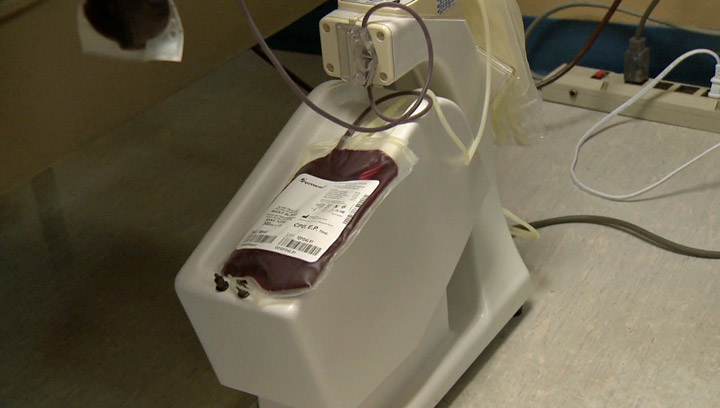TORONTO – Ontario plans to join Quebec in banning payments to people for their blood and blood plasma, following the opening of two paid plasma clinics in Toronto.

The governing Liberals are introducing legislation that also incorporates changes recommended in the wake of a probe into why more than 1,200 cancer patients in Ontario and New Brunswick received diluted chemotherapy drugs.
The proposed measures include giving the Ontario College of Pharmacists the power to inspect and license hospital pharmacies and potentially other locations in the future.
The government says British Columbia, Newfoundland and Labrador, Prince Edward Island and New Brunswick have similar rules.
The Liberals have been trying to prohibit any monetary compensation to people for their blood and plasma, such as reimbursing them for expenses.
The new bill would ensure the poor aren’t exploited or coerced into providing their blood or plasma, said Health Minister Dr. Eric Hoskins.
READ MORE: Five things to know about donating blood
The only exceptions would be blood given only for research and emergency collection due to a major catastrophic event, he said.
“This decision to prohibit payment for blood and plasma donations will in no way reduce the supply or the availability of blood and blood products for Ontarians,” Hoskins said.
“But it will protect the integrity of our current blood donation system – a system that works.”
The legislation would give the province the power to decide which facilities require a licence and which labs or specimen collection centres can have one.
Health Canada currently receives applications for licences, but the provinces and territories can decide whether to allow payment for plasma donors.
Canadian Plasma Resources, which Hoskins said has opened two clinics in downtown Toronto, applied for the licence from the federal government in 2012.
Plasma is a component of blood that can be used for transfusions and to make drugs that can treat patients for conditions like burns, severe infections and hemophilia.
Plasma Protein Therapeutics Association, which represents companies that make plasma products, said it can take hundreds of donations to make a single therapy and patients wouldn’t have the treatment they need without committed donors.
Hoskins insists there would be no shortage of products since Ontario has what it needs. But he acknowledged that Canada receives about 70 per cent of its plasma supplies from outside the country, where people are paid for it.
“It seems a little odd to continue to import those (U.S.) blood donations while not allowing paid donations here,” said Progressive Conservative health critic Christine Elliott.
Health Canada said paid plasma donors are “critical” to ensuring a sufficient supply of blood products in Canada.
The supply from the United States is “extremely safe, due to advancements in blood manufacturing technology which now includes steps to inactivate any viruses or other contaminants,” the government said on its website.
But they can’t test for the next blood-bourne pathogen or disease if they don’t know what it may be, said Antonia Swann, whose husband died after contracting HIV and hepatitis C after receiving tainted blood.
She said she fears there could be another tainted blood tragedy in Canada if paid plasma clinics are allowed to operate.
“We can’t change the past, but what we can do is focus on how to make the blood system as safe as possible,” Swann said.
The federal government launched a public inquiry in 1993 after thousands of people in Canada were infected with HIV and hepatitis C after receiving tainted blood transfusions in the 1980s.
Justice Horace Krever’s 1997 report recommended that blood donors shouldn’t be paid for their donations, except in rare circumstances.
Winnipeg-based drug maker Cangene, which has been operating for decades, is authorized to pay donors for blood plasma, which is used in its products.
Both of Ontario’s opposition parties say they support the ban in principle, but the Progressive Conservatives say they’re concerned about whether the supply will be adequate.
Hoskins said the new legislation combines two separate bills that were automatically scrapped when the June 12 election was called. The Liberals won a majority of seats in the legislature, which means it’s almost certain the bill will become law.

Comments